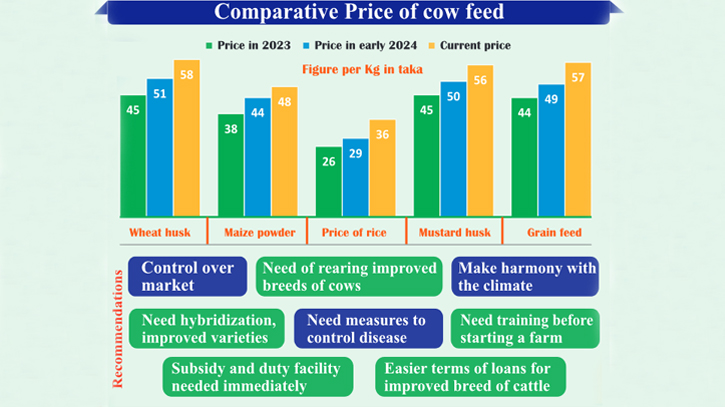
Photo: Messenger
Cattle farmers are struggling due to the increase in feed prices and the high profits made by middlemen. They had hopes to make profits as the price of meat increased after cattle stopped coming from across the border. But that hope is gone as they say it is becoming difficult to earn profits by rearing cows while traders are earning big profits.
Farmers have demanded government subsidy on cow feed and reduced duty.
Experts say individuals or organisations should be more diligent in researching improved breeds, providing loans to farmers on easy terms, training farmers, and preventing disease. They also called on the government to find a market control policy.
Traders in different parts of the country said at the beginning of this year, wheat husk was sold for Tk 1,900 per sack (37kg), maize powder for Tk 1,100 per sack (25kg), grain feed for Tk 1,225 per sack (25kg), mustard cake for Tk 2,500 per sack (50kg), and khud (broken bits of rice) for Tk 1,450 per sack (50kg).
Besides, the price of wheat husk was Tk 51 per kg, maize powder Tk 44, khud Tk 29, mustard cake Tk 50, and grain feed Tk 49.
In the span of three months, the price of wheat husk increased by Tk 7 to Tk 58, maize powder by Tk 4 to Tk 48, khud by Tk 6 taka to Tk 36, mustard cake by Tk 6 to Tk 56, and grain feed by Tk 7 to Tk 57.
But in the beginning of 2023, wheat husk was Tk 45 per kg, maize powder Tk 38, khud Tk 26, mustard cake Tk 45, and grain feed Tk 44. However, the price of these items varies slightly depending on the market and region.
Abdul Momin, a farmer from Jaipur of Manirampur in Jashore, told The Daily Messenger feed prices are increasing gradually and farmers are in trouble.
“Even though the price of meat has increased, we are not getting benefits because traders buy and sell cows at their desired price. We raise a cow all year round and try to recoup the expenses. But traders earn profits of several thousand taka in two to four days,” he said.
There is an organisation called Samaj O Jati Gathan (Sajag) in Dhamrai on the outskirts of Dhaka. It buys cows and gives those to farmers every year after Eid-ul-Adha under a microcredit scheme. Farmers repay by selling the cattle before the next Eid. This time, it has given farmers more than 5,000 cows.
Abdul Matin, director of Sajag, told The Daily Messenger that farmers were hopeful that they would get a good price as cross-border cattle trade stopped but their hope has now turned into disappointments.
“First of all, the price of feed has increased. Second, like other sectors, there is no regulation here,” he said.
Besides controlling the market, he called on the government to subsidise cow feed. He said that farms are decreasing as farmers cannot make profits from rearing cows.
According to the Bangladesh Dairy Farmers Association (BDFA), there are more than 10 lakh small and large cow fattening and dairy farms in the country. 15-20 per cent of the farms have been closed due to the coronavirus pandemic and the increase in feed prices. However, according to the government’s livestock department, the number of farms is higher.
Dr KBM Saiful Islam, a professor in the Department of Medicine and Public Health at Sher-e-Bangla Agricultural University, told The Daily Messenger especially after the Russia-Ukraine war, the price of beef feed has increased and the price of grain feed increased tremendously.
He said the common breeds of cows in the country produce one kg of meat by eating 15-16kg feed. “But improved breeds produce one kg of meat by eating 7-8kg feed. Most of the cows in our country gain 300-400 grams of weight per day whereas the improved or special hybrid breeds gain up to 800-900 grams. As a result, our farmers are suffering losses.”
He gave some suggestions to improve the current situation of cow farmers in the country. They have to make arrangements for rearing improved breeds of cows in harmony with the local weather and climate. If necessary, hybridisation should be done to create improved breeds.
Besides, the government should take more effective measures to control cow disease. Farmers need to receive proper training before starting farms. The professor urged the government to reduce feed duty or provide subsidies, provide loans on easy terms, and regulate the market to save farmers from losses.
The analyst said to reduce the activities of the middlemen, consumers should buy meat on the basis of planned cooperatives. As a result, farmers will get a little bit more price while consumers will also benefit.
As an example, he said, in many cases, it has been seen that traders are buying cows at Tk 500 less and selling them to buyers at Tk 700-800 more. He thinks traders will make profits but there needs to be a limit.
Bangladesh Livestock Research Institute Director Dr Nasrin Sultana told The Daily Messenger whether or not the cow feed needs to be subsidised is a matter of research. Regarding market regulation, she said the government works on this as much as possible.
Messenger/Disha








